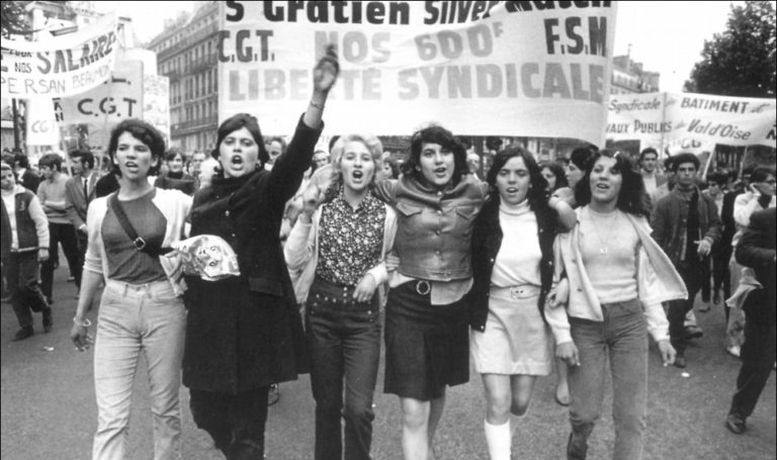Bob Sulatycki is a member of Socialist Alternative (England, Wales & Scotland).
Four months of protest across France. Over a dozen national strike days of action. Rolling strikes and protests, student and school student strikes, hundreds of arrests, road blockages, the storming of luxury shops and restaurants.
The catalyst for this movement has been the so-called pension reform — Macron’s attempt to increase the retirement age from 62 to 64, planned to take effect from 1st September. But the movement is also tied in with wider discontent about the economy, inflation, the cost-of-living crisis, the growing disparities of wealth, the environment, police violence, sexual harassment, and the other miseries of life under capitalism. Many are the same issues which triggered the earlier Gilets Jaunes (Yellow Vests) movement in 2018–19 and beyond.
French capitalism, with its push for cuts to public spending and for closer economic alignment with the rest of the EU, wishes to inflict a defeat on the working class. It’s not just about pensions, it’s about rolling back the accumulated gains of French workers. And that is understood by the working class.
If Macron does succeed, it would represent a serious setback for all workers everywhere, not just in France. However, standing in Macron’s way is a militant working class, with a proud tradition of mass struggle.
The spectre of ‘68
In recent weeks, left wing leader of La France Insoumise, Jean-Luc Melenchon, has raised the call for an all-out general strike, in the style of “May 1968.” This is a positive step, and it is significant that 1968 is now used as a reference point in the struggle. The events of May and June 1968 are often misrepresented as being simply a student revolt, admittedly on a large scale, which was just a reflection of the spirit of the age. Although the students played a very important part, it was the eruption of a mass general strike, involving upwards of ten million French workers, which was the key element of this movement. The strike demonstrated the fundamental power of the working class in a modern capitalist society.
As section after section of blue as well as white collar workers went on strike in late May, a revolutionary ferment gripped society. Impromptu meetings were held, factories and workplaces were occupied, strike committees were established, and different ideas for organizing society were discussed in meetings of thousands of workers. In some cities, such as Nantes and Caen, control slipped from the hands of the existing ruling class into the hands of strike committees.
All the conditions for a peaceful revolutionary transformation of society, as envisaged by Lenin fifty years previously, existed. The bourgeois and its leaders were paralysed. Not only were the ruling class split, the President of the Republic, De Gaulle, fled the country to see whether the French army on the Rhine were still loyal to him. Other sections of the state apparatus were crumbling under the impact of the revolutionary tide. Even the police threatened to join the strike. The European and American ruling classes watched helplessly in trepidation as one of the world’s key imperialist powers stood on the brink.
Yet, this uniquely favourable revolutionary situation was squandered and capitalism in France survived and continued. Why was this?
Historic opportunity wasted
The decisive factor was the lack of a mass revolutionary party rooted in the working class with a clear strategy of overthrowing capitalism. The mass workers’ party that did hold sway in 1968 was the French Communist Party (Parti Communiste Français, PCF). The PCF also had decisive influence in the CGT (Confédération Générale du Travail) union federation. But, despite its name, the PCF did not look at the movement of May and June as an opportunity, but as a threat. The PCF leadership worked to derail it, to separate the workers from the radicalised youth, and to ensure that the demands of the workers were limited to winning short-term concessions on pay and conditions, rather than organizing for a fundamental, socialist change in French society. They opened secret negotiations with Government representatives on a deal to end the strike.
In pursuing this strategy, the PCF were loyally following their ideological masters in the Soviet Union, where in 1968 there existed a corrupted, bureaucratized version of “Communism” — far removed from the ideas of the Russian Revolution of October 1917. By 1968 the Soviet Union had long abandoned any attachment to the idea of assisting in the creation of democratic socialist societies based on Marxist principles. Their main concern was not to rock the boat. Russian foreign policy preferred to keep De Gaulle in place. He had maintained a foreign policy slightly independent of the US, and so, in Moscow’s geo-political considerations, that was in its favour. Of more importance, the Russian bureaucracy, with all its privileges, would have been fatally undermined if there had emerged a democratic, socialist workers’ state in France. The PCF leadership shared this approach, and attacked as ‘ultra-left’ anyone who argued the need to push for fundamental socialist change.
However, if the PCF had been a genuinely revolutionary party, it would have looked to the example of the Bolsheviks of 1917, who led the working class to power, and not the conservative, degenerated Communist Party that existed in Russia since the triumph of Stalin in the mid-1920s.
It should have:
- Expressed solidarity with students occupying their universities and called for the removal and disbandment of the hated riot police, the CRS (Compagnies Républicaines de Sécurité).
- Encouraged the holding of mass meetings in every area, where demands from rank-and-file working-class and young people would be voiced and debated and would contribute to the formulation of a program of demands such as opposition to redundancies and for nationalisation.
- Spread the movement into wider sections of society, such as the small farmers, who had their own grievances and were ready to show their support for the strikes. Nationalisation of the supermarket chains would have guaranteed decent prices for farmers’ produce.
- Made a concerted effort to split the forces of the state, the army and the police, by developing specific, progressive demands such as the right for police and soldiers to join a trade union.
- Paid particular attention to drawing in oppressed layers, such as workers of North African heritage, long marginalized and discriminated against, by developing specific demands opposing their second-class status in French society. These could include a crash program of public housing to get rid of the bidonvilles (shanty towns) and for an amnesty for ‘illegal’ immigrants.
- Developed a strategy and program around female emancipation, through the involvement of women at all levels of the movement, including equal pay, free childcare and abortion rights.
- Called for the extension of workers’ committees to all areas, uniting workers, farmers, young people and small businesspeople, and for these committees to coordinate on a local and national basis to prepare a seizure of power in order to put a workers’ government in place.
Such a strategy was completely within the reach of the PCF at the time, if they had chosen to embrace it. A peaceful socialist transformation of society was completely possible, and the global impact of a workers’ state in a major imperialist power would have been as profound as any previous revolution in history.
Crucial lessons for today
Key questions face the trade union and left leaders in France today where, despite the endurance and exertions of the working class, we are not yet at the stage of a strike on the scale of May 68. For the time being the Intersyndicale — the common front of France’s eight largest trade unions federations (CFDT, CGT, FO, CFE-CGC, CFTC, Unsa, Solidaires, FSU) — has continued with the tactic of one day coordinated actions.
On 14 April, the key elements of the new law were approved by the Constitutional Council, and enacted by Macron the same night. But the struggle is far from over. In 2006, youth-led protests in France were able to overturn a new labour law attacking job security for young workers, even after parliament had agreed the bill.
There is an urgent need for escalation towards an all-out general strike. Such a strike would represent a challenge to the position of Macron and the rule of capital in France itself. It is the fear of unleashing such a revolutionary challenge which would be difficult to control, that causes the union leaderships to hesitate.
Clearly, it is not sufficient to rely on the existing trade union bureaucracy to build for general strike action. To achieve it will require a serious campaign from below. Key will be the role of the General Assemblies, which have been set up in many workplaces. We say that anti-Macron strike committees should be set up across the country, in workplaces, schools, universities and neighbourhouds. These should create committees of action tasked with spreading and linking action in all sectors of the working class, particularly the millions of workers in the poorly organized precarious sector. Mass meetings should be organised on every estate in each town and city, linking workers’ demands with wider social questions facing working people. This would concretely help to draw wider sections into the movement for a general strike, on the lines of what occurred in May and June 1968. If such a movement could be built, challenging the rule of Macron, it would raise the idea of a democratic revolutionary constituent assembly, linking the action committees on a national basis. This would pose very clearly the question of who should rule France — the bankers and billionaires, or the millions of French workers and their allies.
Unlike in 1968, there is no mass party in France playing a decisive role in the struggle. This would require a party rooted in, and actively involving the widest possible layers of working class people. La France Insoumise has taken positive steps in calling for an all-out general strike, and for mass working class struggle, and could play an important role in building such a party if it adopts a revolutionary program to see this struggle through to the end. It is in the course of the titanic battles of the French working class taking place today that such a party can be built.
Recommended reading: France 1968: Month of Revolution by Clare Doyle
This book was first published by Militant in Britain, which then became a founding section of the Committee for a Workers’ International. The CWI became International Socialist Alternative in 2020. France: Month of Revolution remains a concise and inspiring account of the events of those stormy events in 1968. It was republished by Socialist Alternative in 2018. It can be accessed here.



